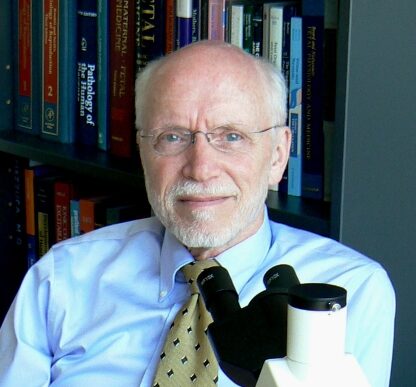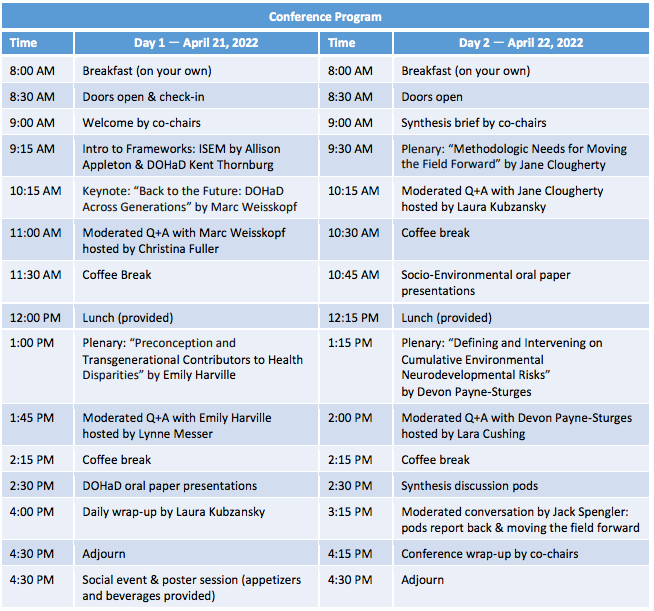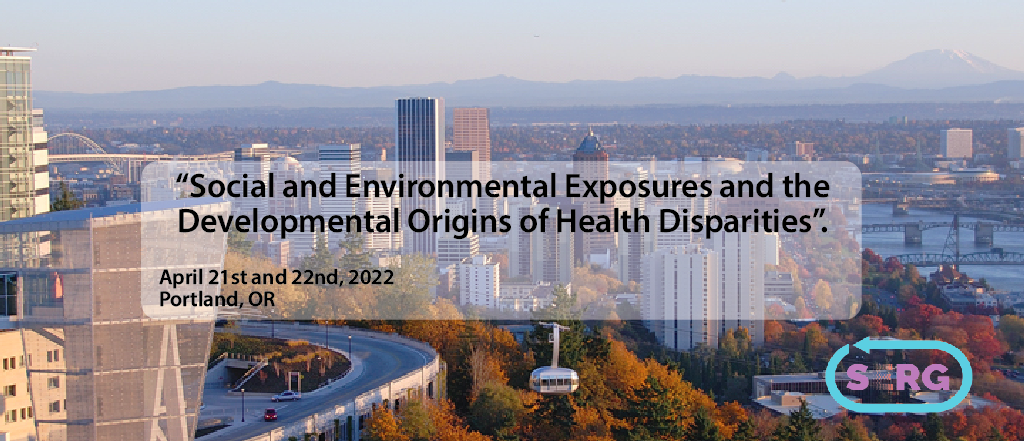Photo by Kent Andersen
The Socio-Environmental Research Group (SERG) is pleased to announce an in-person conference titled “Social and environmental exposures and the developmental origins of health disparities” that will take place in Portland, OR on April 21st and 22nd, 2022. This interdisciplinary event will showcase cutting-edge research focused on the joint contribution of environmental and social factors in the developmental origins of health disparities as well as other emerging work focused on the health effects of joint social and environmental exposures. This 2-day meeting will feature keynote presentations from leaders in the field, paper presentations, lighting talks, a poster session, social events, as well as mentoring opportunities for trainees. The conference will be dedicated to reviewing advancements in socio-environmental health research from a developmental perspective, as well as identifying gaps and the way forward for this emergent research field. Join us to celebrate Earth Day!
Featured Plenary Speakers:
Marc Weisskopf, Emily Harville, Jane Clougherty, Devon C. Payne, and Kent L. Thornburg
Speakers Program Register Abstracts Primers Logistics Organizers Sponsors
Visit our EventBrite page here
Speakers
 Marc Weisskopf, Ph.D.Cecil K. and Philip Drinker Professor of Environmental Epidemiology and Physiology Harvard T.H. Chan School of Public Health
Marc Weisskopf, Ph.D.Cecil K. and Philip Drinker Professor of Environmental Epidemiology and Physiology Harvard T.H. Chan School of Public Health
Conference Presentation Title: “Back to the Future: DOHaD Across Generations”
Marc Weisskopf’s research interests draw from his background in neurobiology. His research primarily aims to study how environmental factors affect the nervous system, as well as the epidemiology of neurologic disorders. Some examples of current work include exploring how exposure to toxicants (e.g., lead, manganese, and air pollution) affect cognitive function and psychiatric symptoms; how air pollution and other toxicants relate to autism spectrum disorder (ASD); and how toxicant exposures like formaldehyde and lead relate to the development of amyotrophic lateral sclerosis (ALS). Although not exclusively, much of Marc’s work is conducted within large cohorts.He worked on risk factors for ALS mortality using the American Cancer Society’s Cancer Prevention Study II cohort, which was the largest prospective cohort study of risk factors for ALS with a cohort size of over 1 million. Marc is now exploring risk factors for ALS within the entire Danish population using their registry system and in large health care databases of several million people in Israel. He has explored the relationship between air pollution exposures and risk of ASD among children of women in the Nurses’ Health Study 2, and is currently examining these questions in the entire Israeli population. Marc is developing efforts in the Nurses’ Health Study 3 to assess the health of the children of this cohort (in particular ASD and attention deficit/hyperactivity disorder) related to the exposures of their mothers. He also works with the Normative Aging Study, a cohort of community-dwelling men in the Greater Boston area.
 Emily Harville, Ph.D.Associate ProfessorSchool of Public Health & Tropical Medicine, School of Medicine Tulane University
Emily Harville, Ph.D.Associate ProfessorSchool of Public Health & Tropical Medicine, School of Medicine Tulane University
Conference Presentation Title: “Preconception and Transgenerational Contributors to Health Disparities”
Dr. Emily Harville is a perinatal epidemiologist with interests in how pregnancy and reproduction relate to health throughout the life course, including the biological mechanisms by which health disparities are created. Major projects include studying the relationship between cardiovascular and reproductive health in the Bogalusa Heart Study; effects of disaster, including the COVID pandemic, on pregnant and postpartum women; and creating a consortium of preconception health studies (the PrePARED Consortium). She is an advisor to the CCREOH (Caribbean Consortium for Research in Environmental and Occupational Health) project in Suriname.She teaches the third-level epidemiologic methods course, EPID 7130 Observational Epidemiology, EPID 6600 Epidemiology of Disparities, and SPHU 3170 Foundations of Epidemiology.
 Jane Clougherty, M.Sc., Sc.D. Associate Professor Department of Environmental and Occupational Health Drexel University
Jane Clougherty, M.Sc., Sc.D. Associate Professor Department of Environmental and Occupational Health Drexel University
Conference Presentation Title: “Methodologic Needs for Moving the Field Forward: Examples from Studies of Synergistic Effects of Multiple Stressors and Pollutants in New York City.”
Jane E. Clougherty is an Associate Professor in the Department of Environmental and Occupational Health at the Dornsife School of Public Health at Drexel University. Dr. Clougherty completed her doctorate and post-doctoral training at the Harvard School of Public Health, and worked at New York City Department of Health and Mental Hygiene from 2008-2010.An interdisciplinary Environmental Health Scientist, Dr. Clougherty’s research focuses on the combined health effects of chronic social stressors and air pollution exposures, particularly in urban community settings. She has designed and implemented a number of studies on intra-urban variation in air pollution exposures and source apportionment, including an assessment of diesel-related organic pollution exposures in downtown Pittsburgh. She is Principal Investigator on several epidemiological studies funded by the U.S Environmental Protection Agency (EPA), National Institutes of Health (NIH), and the Health Effects Institute (HEI) –including a current NIH-funded study using geographic information systems (GIS)-based methods to examine how social and environmental exposures may alter the efficacy of pharmaceutical interventions for asthma in clinical trials.Dr. Clougherty is a board member of the International Society for Exposure Science (ISES), and a member of the International Society for Environmental Epidemiology (ISEE). She was awarded the ISES Sally Liu Award for an Outstanding New Investigator in 2012.
 Devon C. Payne Sturges, Dr.P.H. Associate Professor Maryland Institute for Applied Environmental Health University of Maryland
Devon C. Payne Sturges, Dr.P.H. Associate Professor Maryland Institute for Applied Environmental Health University of Maryland
Conference Presentation Title: “Defining and Intervening on Cumulative Environmental Neurodevelopmental Risks”
Devon C. Payne-Sturges is an Associate Professor with the Maryland Institute for Applied Environmental Health at the University of Maryland, School of Public Health. She also holds a joint appointment in the Department of Epidemiology and Biostatistics. Prior to joining the faculty at the University of Maryland, Payne-Sturges served as Assistant Commissioner for Environmental Health with the Baltimore City Health Department then later as the Assistant Center Director for Human Health with U.S. EPA’s National Center for Environmental Research where she focused on biomonitoring for policy analysis, cumulative risk assessment, health impact assessment, environmental health indicator development, children’s environmental health and environmental health of minority populations. Her research focuses on racial and economic disparities in exposures to environmental contaminants and associated health risks with the aim of improving the science our society uses to make decisions about environmental policies that impact the health of communities and populations, especially vulnerable, low income and minority populations. She is currently conducting research applying systems modeling to evaluate the combined effects of ambient air pollution exposures and psychosocial stressors on disparities in children’s neurocognitive functioning under a K01 award from NIEHS. Payne-Sturges earned her MPH and Doctor of Public Health degrees in environmental health sciences from Johns Hopkins Bloomberg School of Public Health.
 Kent L. Thornburg, Ph.D.Professor School of Medicine Oregon Health & Science University
Kent L. Thornburg, Ph.D.Professor School of Medicine Oregon Health & Science University
Conference Presentation Title: “DOHaD Framework”
Kent L. Thornburg, PhD, is the M. Lowell Edwards Chair of Cardiovascular Research, Professor of Medicine, in the Knight Cardiovascular Institute at Oregon Health & Science University. He holds joint professorships in the Departments of Physiology & Pharmacology, Biomedical Engineering and Obstetrics & Gynecology.He directs the Center for Developmental Health in the Knight Cardiovascular Institute and the OHSU Bob and Charlee Moore Institute for Nutrition & Wellness. Kent has expertise in cardiac and pulmonary physiology, placentology, and developmental programming and studies the physiological adaptations to pregnancy and the roles of maternal diet and body composition in regulating placental and fetal growth and lifelong health. An elected fellow of the American Physiological Society, Kent has served as Editor of the international journal, Placenta, as consulting editor for Pediatric Research; he currently sits on the editorial board of the American Journal of Physiology. He serves regularly on advisory panels at the National Institutes of Health, the American Heart Association and the Children’s Heart Foundation and serves on the scientific advisory board of the Preeclampsia Foundation. Kent has been regularly involved as director of T32 research training for the Knight Cardiovascular Institute and has held grants from four institutes at NIH. He recently co-chaired the task force to determine the 10 year vision of the developmental origins of health and disease for the National Institute of Child Health and Human Development.
Conference Program

DOHaD Oral Paper Presentations
Day 1 — April 21st 2:30-4:00pm PST
2:30-2:45 David Olson — Prenatal maternal stress: the science, what we’ve learned, the issues, and the future
2:45-3:00 Miatta Buxton — Air Pollution as a Potential Contributor to Racial Disparities in Preterm Birth
3:00-3:15 Scott Delaney — Childhood neurocognitive effects of outdoor ambient temperature fluctuations differ by socioeconomic status
3:15-3:30 Elizabeth Holdsworth — Infant and maternal environmental influences on the human milk microbiome
3:30-3:45 Stephanie Eick — Effects of prenatal PFAS and psychosocial stress exposures on fetal growth in two pregnancy cohorts: applying environmental mixture methods to chemical and non-chemical stressors
3:45-4:00 José Ricardo Suárez — Prenatal exposure constructs as effect modifiers to pesticideneurobehavior associations in adolescence
Socio-Environmental Oral Paper Presentations
Day 2 — April 22nd 10:45am-12:15pm PST
10:45-11:00 Terry Thompson — Effects of air pollution exposure predicting sleep efficiency in children modified by exposure to violence, 4-7 years, in the PROGRESS birth cohort
11:00-11:15 Anaïs Teyton— The Impact of PM2.5 Exposure on Emergency Department Visits During the First Year of Life
11:15-11:30 Julia Varshavsky — Current practice and recommendations for advancing how human variability and susceptibility are considered in chemical risk assessment
11:30-11:45 Briana Chronister — Associations of Pesticide Exposure with Depression and Anxiety in Ecuadorian Adolescents, and Effect Modification by Social Determinants of Health
11:45-12:00 Aaron Eisen — Nature Exposure has the Potential to Mitigate Cardiovascular Health Disparities
12:00-12:15 Nicole Bowles — Race and ethnicity are the most adjacent drivers of cardiovascular disease risk after controlling for common social, environmental, and behavioral risk factors
Poster Session Presentations
Day 1 — April 21st 4:30-6:00pm PST
- Diana Ceballos — Metals Dust in Workers’ Homes and Potential for Take Home in the Greater Boston Area
- Vivian Do — Blackout: A nationwide county-level accounting of power outages and vulnerability, 2018– 2020
- Mariangelí Echevarría-Ramos — Pilot Testing Two Take-Home Exposure Prevention Educational Sessions with Construction Workers and their Families
- Nina Flores — The Texas Power Crisis: Distribution, Duration, and Disparities
- Lizbeth Gomez — Modification of Treatment Effects in Asthma Clinical Trials by Social and Environmental Co-exposures
- Natalie Guerrero — Racial discrimination in older adolescence and mental health
- Valerie Pasillas — Methodological Challenges of Incorporating Social-Environmental Exposure Data into Analyses of Older Adults’ Health Outcomes
- Colleen Reid — Perceptions of green space usage, abundance, and quality of green space were associated with better mental health during the COVID-19 pandemic among residents of Denver
- Emma Rieves — Examining the relationship between perceived and objective greenspace exposure and their impact on health outcomes
- Sundas Saboor — Association of Childhood Asthma with Parental Income: Retrospective Assessment of Fragile Familes’ Data
- Rachit Sharma — Non-linear modification by neighborhood violence in air pollution-asthma relationships
- Andie Thompson — Accounting for the structural dimensions in the social determinants of health: Lessons from maternal health scientists
- Yifan Wang — Disparities in Ambient Nitrogen Dioxide Pollution in the United States
- Astrid Zamora — Exploring connections between phthalates and sleep health in a Mexico City birth cohort
Registration – opens January 24, 2022
If the conference is changed to an online format there will be no registration costs and your registration payment will be fully refunded
Visit our EventBrite page hereAbstracts
 Social and environmental exposures and the developmental origins of health disparities
Social and environmental exposures and the developmental origins of health disparities
The Socio-Environmental Research Group (SERG) is pleased to announce a call for abstracts for an in-person conference in Portland, OR on April 21-22, 2022. This interdisciplinary event will showcase cutting-edge research focused on the joint contribution of environmental and social factors in the developmental origins of health disparities as well as other emerging work focused on the health effects of joint social and environmental exposures. This 2-day meeting will feature keynote presentations from leaders in the field, paper presentations, lighting talks, a poster session, social events, as well as mentoring opportunities for trainees. A link to the full conference program and list of confirmed speakers can be found here.
Abstracts relevant to the general theme of the conference are welcome, as are abstracts in these emphasis areas:
- How do social and environmental exposures occurring during critical periods of development (e.g., pre-conception, prenatal, early life) jointly influence health disparities over the life course?
- What are the methodological challenges in socio-environmental health disparities research, and what are some novel solutions?
- Emerging work focused on the health effects of joint social and environmental exposures
Primers
Who we are:
The Primers:
Audience for Primers:
Logistics
- Hotel information
- The official hotel for the conference is the Hyatt House Portland/Downtown. The hotel is a five minute walk from the venue (.2 miles). Our discount code has expired, but rooms are still available as of 3/24.
- Other hotels near the venue:
- Airport information
- Portland International Airport is located about 10 miles northeast of the conference venue and city center.
- Car services such as Lyft and Uber can pick travelers up directly from the arrivals terminal at PDX.
- Venue information
-
- Knight Cancer Research Building 2720 S Moody Ave, Portland, OR 97201
-
- Parking
- Parking at the venue is limited. Walking, public transportation via the Portland Street Car, or car drop off is recommended. Attendees who need to park should utilize OHSU’s Schnitzer Lot and will need to purchase a parking pass on site using the pay stations.
- What to expect
- Lunch will be provided on both days of the conference. Please email SERGconference@gmail.com if you have any dietary needs.
- A social event is scheduled on Day 1 of the conference. Drinks and appetizers will be provided.
- COVID-19
- It is OHSU’s policy that all attendees of an OHSU sponsored event are either fully vaccinated or have received a negative PCR test within 48 hours of the event. By registering or attending this event, you agree to be in compliance with this policy.
- Childcare options
- Downtown Portland KinderCare 1400 SW 5th Ave Ste 100, Portland, OR97201
- Health Starts Children’s Center at OHSU 3325 SW Moody Ave, Portland, OR 97239
- Adult care information
- Seniors
- Silver Years Day Center 6020 SW Arctic Drive, Beaverton, OR 97005
- Seniors
- Hospital information
- The conference will take place on Oregon Health and Science University’s Portland campus. Though the main hospital is a tram ride up the hill, conference attendees can easily access the hospital facility and emergency care if needed.
Organizers
Chairs
 Allison A. Appleton, ScD, MPH
Allison A. Appleton, ScD, MPH
Conference Co-Chair
Associate Professor of Epidemiology and Biostatistics
School of Public Health
University at Albany
Dr. Allison Appleton is a Social Epidemiologist, with postdoctoral training in cardiovascular epidemiology and epigenetics. She is an Associate Professor or Epidemiology at the University at Albany School of Public Health. Her interdisciplinary research blends theory and methods from the epidemiology, the social sciences, environmental health, and molecular epidemiology to understand how psychosocial and environmental exposures become biologically embedded to affect health, both within and across generations. She is the Principal Investigator of the Albany Infant and Mother Study(AIMS), a prospective birth cohort of racial/ethnic diverse and socially disadvantaged pregnant women and their babies that seeks to understand how psychosocial stress and toxicant exposures during pregnancy jointly contribute to birth and child health outcomes, as well as to epigenetic alterations that might help explain the associations. Dr. Appleton was an inaugural JPB Environmental Health Fellow, and continues to engage with the program as a Senior Fellow and mentor to current fellows.
 Hector Olvera Alvarez, Ph.D., P.E.
Hector Olvera Alvarez, Ph.D., P.E.
Conference Co-Chair
Senior Associate Dean for Research
School of Nursing
Oregon Health and Science University
Hector A. Olvera-Alvarez is the Associate Dean for Research at Oregon Health and Science University School of Nursing. He received a PhD in environmental science from the University of Texas at El Paso and graduate certification in epidemiology from the University of Michigan. Hector is also a Senior Fellow in the JPB Environmental Health Fellowship. At OHSU he directs the Total Environment and Wellness laboratory where he and his team study how social and environmental conditions interact and how they can be leveraged to help vulnerable populations attain health and well-being.Currently, his work focuses on disentangling the biobehavioral pathways through which nature and other protective factors counteract susceptibilities induced by early life stressors.
Scientific Planning Committee
- Allison Appleton
- Susan Bagby
- Edgar Gil Rico
- Laura Kubzansky
- Lynne Messer
- Hector Olvera Alvarez
- Kent L. Thornburg
Conference Organizing Committee
- Allison Appleton
- Annie Belcourt
- Greg Bratman
- Lara Cushing
- Katie Dickinson
- Christina Fuller
- Hector Olvera Alvarez
Local Organizing Committee
Sponsors
The conference is funded with support from the National Institute for Environmental Health Sciences (NIEHS; 1R13ES032313-01), the JPB Environmental Health Fellows Program, the Oregon Health & Science University (OHSU) Moore Institute, and the OSHU School of Nursing.









